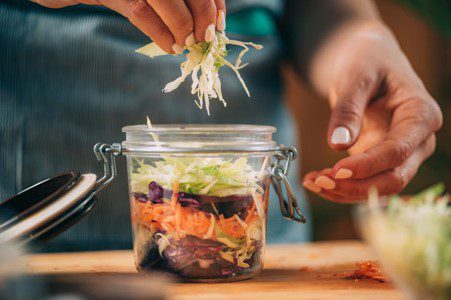
We’ve all been there; the doctor prescribes an antibiotic for an infection, and you know you should take it, but you dread what it’s going to do to your gut health. So how do you restore your gut health after antibiotics? There is so much you can do to support your gut health, but let’s start with what the antibiotics are doing to your gut to start with.
How do antibiotics work anyway?
The first antibiotic was discovered by accident in 1928; this was penicillin. Since that discovery, antibiotics have saved thousands of lives, but now we are at a point in time where antibiotics seem to be over prescribed and misused resulting in antibiotic resistance.
Antibiotics only destroy bacteria, not viruses or fungi/yeasts. They do this by disrupting the bacterial cell wall, preventing the bacteria reproducing, or by blocking protein production in the bacteria.
We know that antibiotics are absorbed into the bloodstream, whether it’s orally via the gut or intravenously, and this is how they get to where the infection is, for example, an infection in your big toe or in your sinuses. We know that a healthy gut has a healthy microbiome (AKA gut bacteria), so when antibiotics pass through the gut (whether orally or through the blood supplying the epithelial cells in the intestinal lining) they can have a detrimental effect on our gut microbiome.
A broad-spectrum antibiotic doesn’t discriminate between good gut bacteria and bad bacteria, it just takes them all down. This can lead to opportunistic bacteria overgrowing and causing dysbiosis, otherwise known as an unbalanced microbiome. This can lead to symptoms such as Antibiotic-Associated Diarrhoea (AAD), bloating, and gastrointestinal distress.

How long does it take to restore the gut after antibiotics?
Some say it can take up to 12 months to restore the gut microbiome after a short course of antibiotics; however, a more accurate description would be that the majority of the microbiome recovers after 1 – 2 months. But it’s important to know that a few species can take longer to recover, or not recover at all, and this is how opportunistic pathogens can move in and create issues for years to come, plus, antibiotic resistant genes can persist.
What can I do to improve my gut health?
The more you can do for your gut health on a day-to-day basis the better, so that you have a robust foundation should the need arise to take antibiotics. As we learn more and more about gut health and how it impacts the rest of the body, the more the emphasis should be placed on the gut as a central focus for overall wellbeing and health.
Improve your gut health before, during and after antibiotics:
Feed your microbiome:
- Aim to eat 30 grams of fibre daily, in particular soluble fibre.
- Eat a variety of plant foods every week, including herbs and spices to encourage microbiome diversity.
- Eat fermented foods daily such as sauerkraut, kimchi, or yoghurt, as they contain good bugs such as Lactobacillus.
- Eat prebiotic foods such as onions, garlic, Jerusalem artichoke as they feed the good gut bugs.
- Having bone broth regularly can also support the gut lining and mucous membranes.
- Eat colourful foods full of antioxidants which not only support the body to reduce free radicals, but the polyphenols can also act as a prebiotic to feed the good gut bugs.
- Avoid regular consumption of sugar, alcohol, industrial seed oils as these all have a detrimental effect on the microbiome.
Move your body:
- Get out for your walk or run: Aerobic exercise may improve your microbiome diversity, in particular, a certain phylum which supports the gut-brain axis and mood.
- Choose any exercise that makes you feel good! Exercise can influence by-products (postbiotics) produced by gut bacteria, which may have the potential to reverse certain conditions associated with metabolic diseases.
Reduce your stress:
- The gut-brain-axis is a bi-directional communication highway which influences the microbiome and vice versa. Stress can therefore be detrimental to the gut environment.
- Finding time for stillness and self-care is essential for managing the stresses that life throws at us.
- Time in nature is one of the best ways to reduce stress and at the same time support your microbiome.
- Getting a good night’s sleep is also important for repairing our body overnight, but also having a diverse microbiome can support a good night’s sleep.
Take a daily probiotic:
- Choosing a probiotic that has strains specific to your health needs is important.
If it’s gut health you need support for then choose a gut-specific probiotic; if its skin support you need then choose a product that includes strains for skin; and ladies, if it’s vaginal support you need, look for one with strains that support the vaginal microflora.

Why should I take probiotics with a course of antibiotics?
It’s recommended to take advanced, gut-specific probiotics whilst on a course of antibiotics. New research suggests that you can even take them at the same time; no longer do you have to try to work out when to take your probiotic, e.g., two hours away from your antibiotic, when you’re taking an antibiotic three times a day!
Benefits include:
- During a course of antibiotics, the gastrointestinal tract (and contents) will be constantly exposed to the antibiotics via the blood stream, not just when it’s consumed. Research has shown that probiotics taken closest to the first dose of antibiotics will still support minimising the side effects.
- Supports the existing commensal gut bacteria and reduces the risk of a pathogenic overgrowth.
- Certain probiotic strains also support against Antibiotic-Associated Diarrhoea (AAD). They do this by crowding out pathogenic microbial overgrowth whilst antibiotics are being consumed.
- Support the immune balancing aspect and minimises the risk of future infections.

Summary
The main takeaway is start now!
Start looking after your gut health as this will also support your immune system and possibly reduce the need for antibiotics in the future. Of course, there are always times when you will need antibiotics, they can be lifesaving. By supporting your gut health on a daily basis with all the tools mentioned here, the need to restore your gut health after antibiotics won’t be as hard to do as you’ll have a strong foundation for your gut health and your overall health.
For more information on what to look for in a probiotic read 5 things to look for in a gut health probiotic.
If you are at all concerned with your gut health, please see your GP, or connect with a natural health professional to personalise your diet, lifestyle, and probiotic or herbal supplements.
